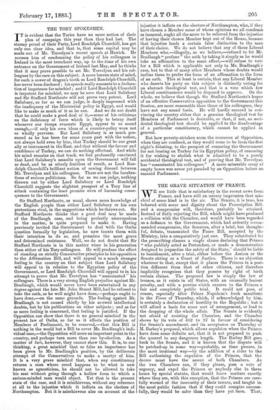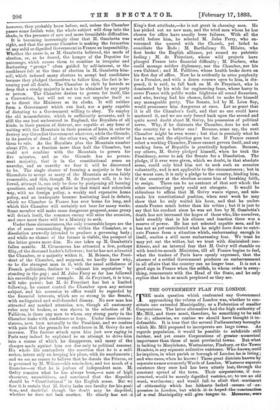THE GRAVE SITUATION OF FRANCE.
WE see little that is satisfactory in the recent news from France, and have still an uneasy impression that mis- chief of some kind is in the air. The Senate, it is true, has behaved with sense and dignity about the Proscription Bill, and a compromise will, therefore, probably be attained. Instead of flatly rejecting the Bill, which might have produced a collision with the Chamber, and would have been regarded as a defiance to the Government, which had ardently recom- mended compromise, the Senators, after a brief, but thought- ful, debate, transmuted the Faure Bill, accepted by the Ministry, into a comparatively just one. They substituted for the proscribing clauses a single clause declaring that Princes "who publicly acted as Pretenders, or made a demonstration designed to jeopardise the safety of the State," should be liable to banishment, after a trial, either before the Assizes or the Senate sitting as a Court of Justice. There is no objection whatever to that, except that it places the Princes in a posi- tion different from that of other citizens, and therefore implicitly recognises that they possess by right of birth certain claims. The proposed law is simply the law of treason, as it exists in all States, with an unusually lenient penalty, and with a proviso which ensures to the Princes a fair and completely public trial. It could not pass, of course, especially after Prince Napoleon's fresh manifesto in the Times of Thursday, which, if acknowledged by him, is certainly a declaration of hostility to the Republic ; but it will afford a basis for some sort of arrangement, or lead to the dropping of the whole affair. The Senate is evidently not afraid of resisting the Chamber, and the Chamber shows by its vote of 402 to 97 in favour of considering the Senate's amendment, and its acceptance on Thursday of
M. Barbey's proposal, which allows expulsion when the Princes have done some definite act, that it is not prepared to push the quarrel to any dangerous length. The Barbey Bill goes back to the Senate, and it is known that the dispute will be patched-up in some way—probably, as time presses, in the most irrational way—by the addition of a rider to the Bill authorising the expulsion of the Princes, that the decree must have the assent of both Chambers. As the two Chambers can, if they please, pass a vote of urgency, and expel the Princes or anybody else in three hours by special statute, that would leave matters exactly where they are, with this exception, that the Princes are care- fully warned of the insecurity of their tenure, and taught in the most public fashion that if they could conspire success- fully, they would be safer than they have yet been. That, however, they probably knew before, and, unless the Chamber passes some foolish vote, the whole subject will drop into the shade, in the presence of new and more formidable difficulties. It is becoming increasingly clear that M. Gambetta was right, and that the present Chamber is making the formation • Of' any solid or dignified Government in France an impossibility. Whether the cause is, as M. Gambetta believed, the mode of election, or, as he feared, the hunger of the Deputies for patronage, which causes them to combine in irregular and fluctuating "groups" often guided by self-interest, or the confidence felt at the time of election in M. Gambetta him- self, which induced many electors to accept bad candidates because they pledged themselves to follow him, the fact is be- coming past all doubt. The Chamber is cleft by hatreds so deep that a steady majority is not to be obtained by any party or person. The Chamber desires to govern for itself, like a Convention, but will not or can not organise itself so as to direct the Ministers as its clerks. It will neither form a Government which can lead, nor a party capable of dictating to a Government willing to obey. To employ the old nomenclature, which is sufficiently accurate, and is still the one best understood in England, the Royalists of all kinds, in their passion of distrust, are capable at any hour of uniting with the Mountain in their passion of hate, in order to destroy any Girondist Government whatever, while the Gironde, in its passion of dread of the other two, will allow neither of them to rule. As the Royalists plus the Mountain number about 270, or a fraction more than half the Chamber, but could not combine with the Mountain to govern for five minutes, and as the Gironde has no perma- nent majority, that is in the constitutional sense an anarchy, and an anarchy we fear it will be discovered to be. The single chance of forming a majority is for the Girondists to accept as many of the Mountain as seem fairly reasonable, and this, though M. de Freycinet will, it is be- lieved, attempt it, can only be done by postponing all burning questions, and carrying on affairs in that timid and colourless way, with no foreign policy, a weakly and expensive home policy, and an inadequate because hesitating lead in debate, which no Chamber in France has ever borne for long, and which this Chamber will certainly not bear for many weeks, Some member will make some dangerous proposal, some group will detach itself, the common enemy will seize the occasion, and once more there will be a Ministry to seek.
Under these circumstances, the only reasonable hopes are the rise of some commanding figure within the Chamber, or a dissolution avowedly intended to produce a governing body ; and while no chance of the former is visible, the prospect of the latter grows more dim. No one takes up M. Gambetta's fallen mantle. M. Clemenceau has attracted a few, perhaps fifty, of the deceased leader's followers ; but he has not attracted the Chamber, or a majority within it. M. Brisson, the Presi- dent of the Chamber, and supposed, we hardly know why, 'to be the strongest man in it, with the usual selfishness of French politicians, declines to "exhaust his reputation" by 'standing in the gap ; and M. Jules Ferry so far has followed his exceedingly prudent example. M. de Freycinet, it is true, 'will take power; but M. de Freycinet has but a limited following, he cannot control the Chamber upon any serioua subject, and his accession to office would be regarded by the financial interests, which are so strong in the Senate, -with undisguised and well-founded dismay. No new man has attracted any marked attention, nor, though all customary rules may be broken, as was shown in the selection of M. Fallieres, is there any man to whom any strong party in the Chamber looks with confidence or hope. Under these circum- stances, men turn naturally to the President, and we confess • with pain that the grounds for confidence in M. Grevy do not . increase. The furious attack upon him just now raging in Paris may indeed be explained as an attempt to drive,hini into a course of which he disapproves, and many of the charges made against him are due only to political rancour, His whole life contradicts the assertion that he is a selft • seeker, intent only on keeping his place, with its emoluments and we see no reason to believe that he dreads the Princes, or is governed by M. Wilson—his son-in-law, and too much of a financier—or that he is jealous of independent men. MI Orevy remains what he has always been,—a man of hig4 oharacter, unambitious, and convinced that the Republi should be " Constitutional " in the English sense. But w -fear it is certain that M. Grevy lacks one faculty lor.his post tione and doubtful, though the doubt may be dispelled 'whether he does not lack another. He clearly las not ,el King's first attribute,—he is not great in choosing men. He has picked out no new man, and the tried men whom he has chosen for office have usually been failures. With all the world before him, he selected M. Jules Ferry, who en- venomed the quarrel with the Charch, yet failed to conciliate the Reds ; M. Barthelemy St. Hilaire, 'who first broke the English alliance, yet roused no patriotic feeling ; M. de Freycinet, whose wild projects have plunged France into financial difficulty ; M. Dueler°, who could manage neither diplomacy, nor the Chamber, nor his own Cabinet ; and M. Fallieres, whose health broke down on his first day of office. Now he is evidently in utter perplexity for a Premier, and with a dozen courses open to him, is dis- -posed, it is said, to fall back on M. de Freycinet, who is dominated by his wish for engineering fame, whose hurry to cover France with public works frightens all sound financiers, and who, having had his chance, failed to make for himself any manageable party. The Senate, led by M. Leon Say, would pronounce him dangerous at once. Let us grant that it is all the Chamber's fault, and that no one could have mastered it, and we are only forced back upon the second and quite novel doubt about M. Grevy, his possession of political nerve. Why, if he distrusts the Chamber, does he not ask the country for a better one ? Because, some say, the next Chamber might be even worse ; but that is precisely what he has to see, and the objection goes too far. If France cannot select a working Chamber, France cannot govern itself, and any working form of Republic is practically hopeless. Because, say others, M. Grevy pledged himself, when he took the Presidency, never to ask the Senate for a Dissolution. The pledge, if it ever were given, which we doubt, in that absolute sense, could only bind him not to seek such an occasion voluntarily, and is not applicable to the circumstances ; but in the worst case, it is only a pledge to the country, binding him, if the country at the election accuses him of breaking faith, to resign. There can be no contract of that sort which the other contracting party could not abrogate. It would be ridiculous to affirm that M. Grevy wants vigour, and mis- reads his constitutional position, when next week he may show that he only waited his hour, and that he under- stands France much better than his critics ; but it is just to say that his conduct since he was set free by M. Gambetta's death has not increased the hopes of those who,like ourselves, held steadily that in his silence and inaction there was a reserve of power. He has not selected capable men, and he has not as yet contributed what he might 'have done to extri- cate France from a situation which, embarrassing enough in itself, excites a still more embarrassing fear. We trust he may yet cut the withes, but. we trust with diminished -con- fidence, and an internal fear that M. Grevy will stumble on with hand-to-mouth Ministries, till all France 'begins to feel, what the traders of Paris have openly expressed, that the absence of a settled Government produces an embarrassment in all affairs that the country can no longer bear. It is not a good sign in France when the selfish, to whom 'order is every- thing, remonstrate with the Head of the State, and he only replies that he is as much perplexed as they, are.















































 Previous page
Previous page